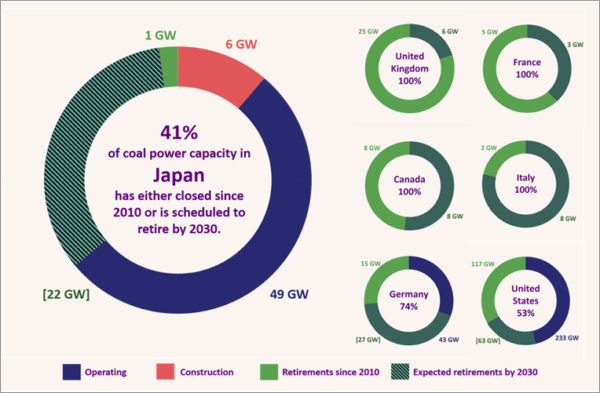On May 14th, UK climate change think tank E3G released its report “G7 Coal Report 2021: Charting the course away from coal,” which evaluates the phasing out of coal-fired power generation at the G7 countries. Since 2015, E3G has tracked G7 progress on coal through a series of scorecard reports that assess G7 member performance. This report is the sixth edition.
2021 is the year for G7 action on coal
The 2021 analysis revealed the following:
- G7 action on coal matters. G7 countries are home to 68% of OECD (Organization for Economic Cooperation and Development) & EU coal capacity (as of May 2021). G7 progress on coal is an essential enabler of a broader coal exit by 2030.
- The G7 can seize the opportunity to phase out coal by 2030. Since 2010, G7 countries have already retired around 174GW of coal power plants, with a further 138GW scheduled to retire by 2030. This means that around 59% of collective coal power capacity across the G7 has either closed already since 2010 or is scheduled to retire by 2030.
- Performance has improved in all countries for the first time in six editions of E3G’s annual progress report. However, Japan remains at the bottom for the sixth consecutive year in terms of market trends and government policy conditions, which are comparative evaluation criteria, as well as efforts toward decarbonization. The underlying direction of government policy actions is positive, providing a platform for both further acceleration of national coal phase out efforts and G7 cooperation. This confirms an emerging ‘hidden consensus’ that major economies like the EU, US and UK are on track for a zero-carbon power system by 2035.
Progress of each country:
- Canada, France, Italy and the UK are all on track for 100% phase out, with multiple coal power plants already closing.
- Germany’s revised climate law will require its 2038 coal phase out date to be brought forward to 2030. EU Emissions Trading Scheme prices and cheap renewables are already making coal uneconomic.
- In the United States, the Biden Administration’s commitment to 2035 net zero power would see coal generation offline around 2030.
- Japan’s commitment to 46-50% greenhouse gas reduction by 2030 will require a step change in power sector decarbonisation. Japan’s plan to retire its less efficient coal units by 2030 can be expanded. Meanwhile, the cancellation of the final two projects not yet under construction means that no new coal plants are under development across the entire G7.
- The EU has emerged as a player on coal diplomacy, following a call from its foreign ministers in January to phase out coal globally. This creates more opportunities for strengthening G7 efforts and linking international commitments with domestic efforts across Europe and the rest of the OECD.
E3G recommendations: G7 collective leadership on coal
Drawing on the analysis of G7 member progress and global trends, E3G has three recommendations for G7 collective efforts to accelerate the broader transition away from coal power:
-
- Acknowledge that power sector transformation requires both coal exit and clean energy additions
The G7 should explicitly recognise for the first time that its members will aim to phase out coal power generation by 2030 and encourage other OECD countries to do likewise. - Confirm an end to international coal finance
The G7 should commit to ending all international public finance for coal power generation and associated facilities, including through working together to strengthen the OECD export credit regime. - Enable the retirement of coal power generation
G7 members should recognise the growing need for financial instruments to enable the retirement of coal power generation and commit both finance and diplomatic support to dedicated initiatives and instruments.
- Acknowledge that power sector transformation requires both coal exit and clean energy additions
Report Download:
Charting the course away from coal: the G7’s leadership opportunity(Link)
CHARTING THE COURSE AWAY FROM COAL: THE G7’S LEADERSHIP OPPORTUNITY G7 COAL SCORECARD – SIXTH EDITION (PDF)
Related Article (from E3G): Time and tide wait for no one: Japan’s coal progress (Link)
Written / Published by:E3G
Published : May 14, 2021

